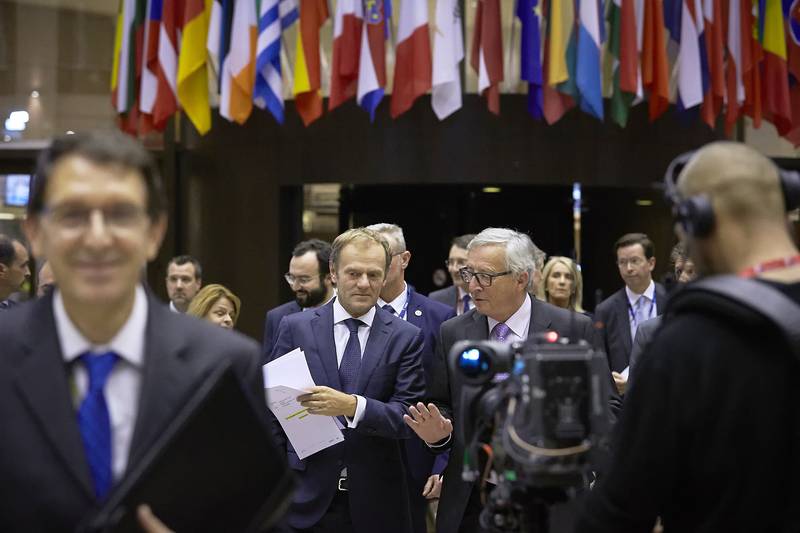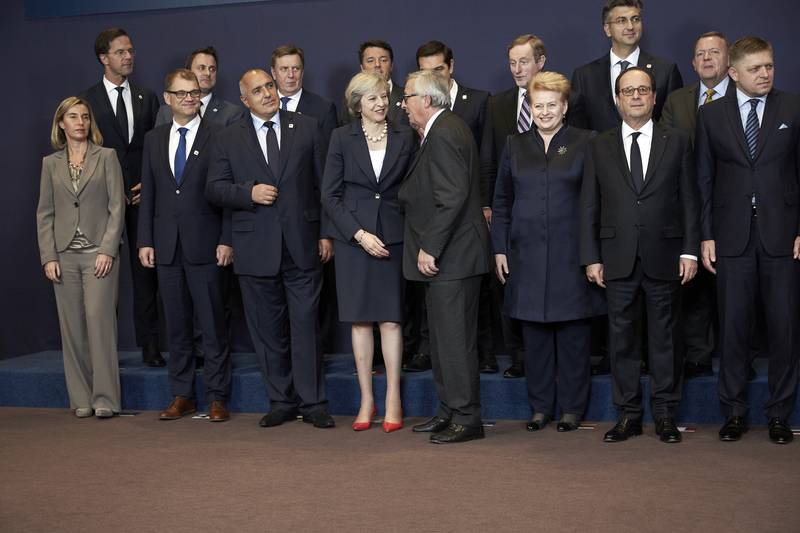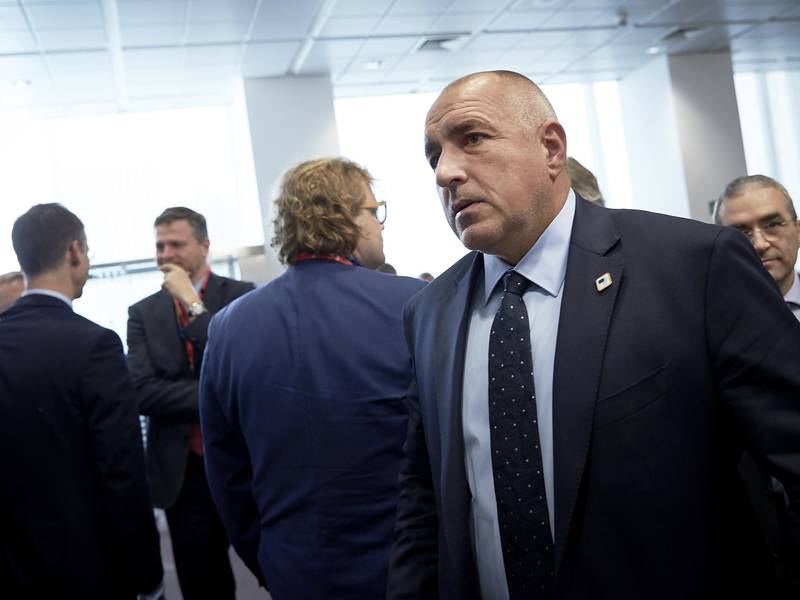The December European Council - Another Toxic EU Summit
Adelina Marini, December 14, 2016
 So little is expected of the EU and the atmosphere is so volatile! This year’s summarising Union summit will be just one day, but the programme is full of subjects which can turn very wrong. The only chance of success is in the meagre Bratislava declaration, on the implementation of which it is expected that the Slovak presidency will report progress. All the rest is a minefield, as it was described by a high-ranking official of the EU. The summit will begin at 1230 with lunch, at which leaders are supposed to discuss migration and all its aspects, among which the implementation of the agreement between the EU and Turkey. One of the summit’s goals will be to show that European leaders believe that the agreement with Turkey is working. This is one of the mines in the summit minefield, which is expected to be stepped on by Austria after Vienna blocked the adoption of conclusions regarding the negotiation process with Turkey.
So little is expected of the EU and the atmosphere is so volatile! This year’s summarising Union summit will be just one day, but the programme is full of subjects which can turn very wrong. The only chance of success is in the meagre Bratislava declaration, on the implementation of which it is expected that the Slovak presidency will report progress. All the rest is a minefield, as it was described by a high-ranking official of the EU. The summit will begin at 1230 with lunch, at which leaders are supposed to discuss migration and all its aspects, among which the implementation of the agreement between the EU and Turkey. One of the summit’s goals will be to show that European leaders believe that the agreement with Turkey is working. This is one of the mines in the summit minefield, which is expected to be stepped on by Austria after Vienna blocked the adoption of conclusions regarding the negotiation process with Turkey.
Austria insists that this process be frozen because of the considerable retreat of Turkey regarding democracy, rule of law and fundamental rights. It is possible that Austrian Chancellor Christian Kern raises the subject and it turns into one of the points of conflict during lunch. Another controversial subject, linked to migration, is the so called “effective solidarity”, which concerns the quota distribution of refugees. There is talk that there is some convergence of positions on some aspects of this subject but it remains a source of intra-Union tension.
There is another potentially explosive subject on the leaders’ menu, which has an even larger potential of ruining or lengthening the summit (or at least the lunch) – the subject of Ukraine. The apple of discord is finding a solution to the problem, created by the Dutch referendum earlier this year, in which the comprehensive trade agreement with Ukraine was discarded. Until now there is no agreement reached to satisfy the Netherlands, the only state left to not have ratified the agreement. It is a difficult balancing act for besides pleasing The Netherlands, the text needs to be such as not to call for a second ratification of the other 27 members, the European Parliament, and Ukraine itself.
The Ukrainian case starts to look more and more like the problem which turned into a major one for the October summit - the trade agreement with Canada (CETA). Some media have even began naming Prime Minister Mark Rutte “the Dutch Paul Magnette” – Prime Minister of the Belgian province of Wallonia, whose parliament blocked the signing of the agreement with Canada. Sources close to the negotiations shared that the subject is loaded with much emotion and tension. Expectations are that this subject will possess the entire December summit for, similar to the Canada agreement, it also has strong geopolitical significance and will be a signal of EU's capability for brokering trade agreements. Strong pressure is expected by the pro-Ukrainian states in the EU – Poland, the Baltic States, Romania, and Croatia.
It is also expected that in the context of the Ukraine there will be discussion of the subject of extending the sanctions against Russia because of the failure to comply with the Minsk agreements. Similar to the October summit, it cannot be expected that at this one there will be new sanctions levied on Russia because of what is happening in Syria, regardless of it being much worse than what it was two months ago. According to a diplomatic source, the same states are once again opposed to new sanctions. In October, the only side to impose a veto was Italian PM Matteo Renzi. At the December 15 summit, however, Italy will be represented by its new Prime Minister Paolo Gentiloni, following Mr Renzi’s resignation due to the failed constitutional referendum in the beginning of December.
Until now Mr Gentiloni was foreign minister in the government of Matteo Renzi. Will he continue the line of his former superior – we will see on Thursday. It is expected that leaders will adopt conclusions on Syria, which will be far removed from what the situation calls for at the moment.
During the afternoon session, leaders will discuss the formation of a defence union. This is another sensitive subject but it is unlikely to cause any major conflict. Not at this stage at least. It is expected that leaders will adopt conclusions on this subject, encompassing three large subtopics. One is the implementation of the EU’s global strategy, the other is the formation of a defence fund, and the third one is cooperation between the EU and NATO. The last one is the sensitive spot, because of which President Tusk has made it his job to forge out such a message which will clearly show that the EU has no intention of doubling on NATO’s functions. This is the subject on which this part of the summit will be joined by the Secretary General of the Alliance Jens Stoltenberg.
 The ambition of President Tusk is for the EU to prove that it is capable of taking on larger responsibilities and playing a more useful role. Another topic on the agenda for the afternoon session are economic issues on which, however, there is no friction expected. On this subject discussions will be joined by European Central Bank chief Mario Draghi, who recently called on leaders not to forget their commitment to finish the building of the euro area. This is not, however, what the main topic of the conversations will be. Instead, leaders will review what has been achieved in the building of the energy union and the common market. They will also discuss the decision to expand the European Fund for Strategic Investments and increased support for the Youth Employment Initiative.
The ambition of President Tusk is for the EU to prove that it is capable of taking on larger responsibilities and playing a more useful role. Another topic on the agenda for the afternoon session are economic issues on which, however, there is no friction expected. On this subject discussions will be joined by European Central Bank chief Mario Draghi, who recently called on leaders not to forget their commitment to finish the building of the euro area. This is not, however, what the main topic of the conversations will be. Instead, leaders will review what has been achieved in the building of the energy union and the common market. They will also discuss the decision to expand the European Fund for Strategic Investments and increased support for the Youth Employment Initiative.
The summit will finish with an informal meeting of the member states, without Great Britain, during which it is expected that the commitment from June will be reconfirmed. Then leaders agreed on not engaging in bilateral negotiations with Great Britain and that there will be negotiations only after the United Kingdom triggers Article 50 of the Treaty of the EU for leaving. Sources from the EU are hinting that it is possible that leaders will discuss additional principles. The aim of the discussion will be wrapping up procedural issues on the Brexit. In the previous summit, in October, British PM Theresa May was outraged by the informal meetings of the 27 while Great Britain remains a full member, but British media report that now she has no objections against not being invited to the informal dinner.
Translated by Stanimir Stoev
 Boyko Borissov | © Council of the EU
Boyko Borissov | © Council of the EU